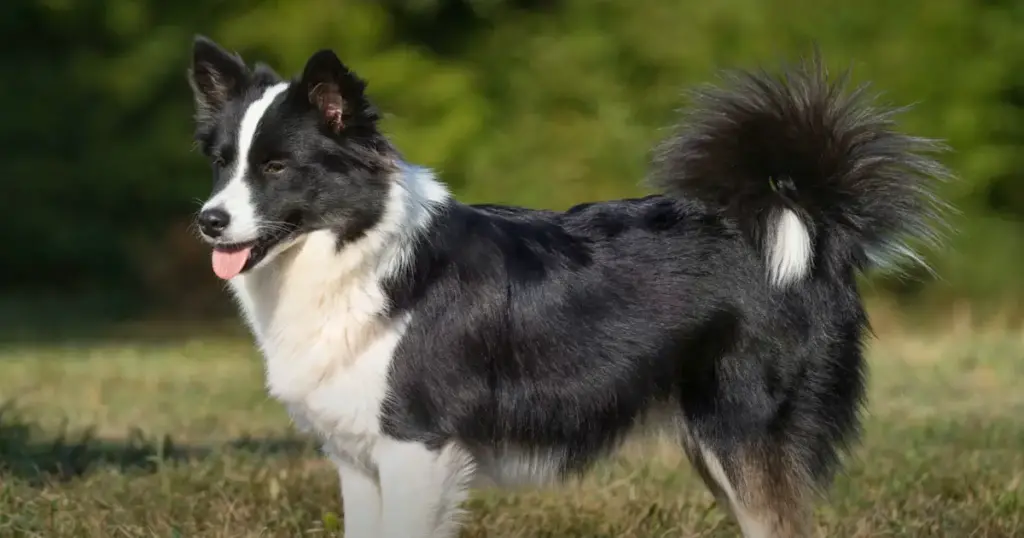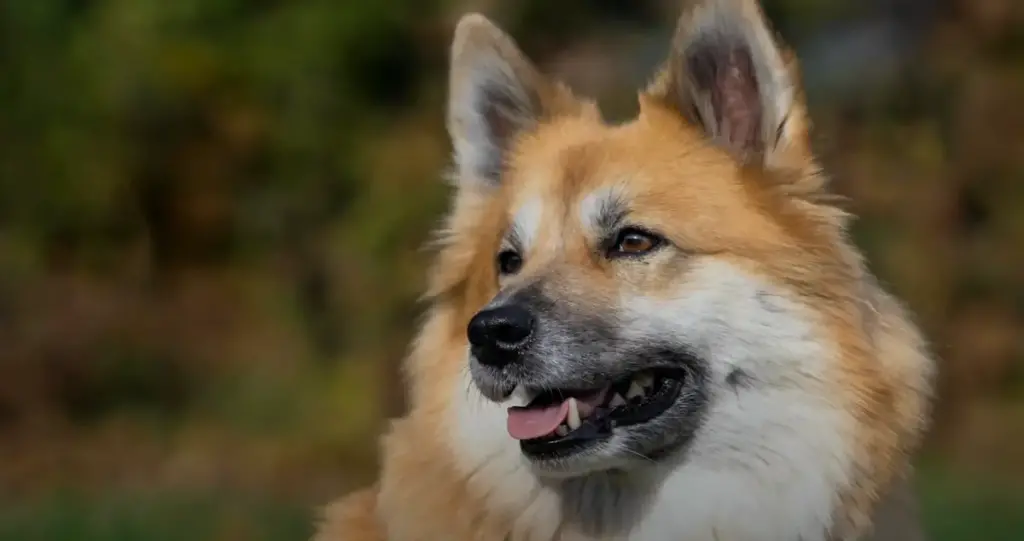As they say, a dog is a man’s best friend, and the Icelandic Sheepdog is a testament to that time-honored adage. With its rich history as a dependable herder, this breed possesses a unique blend of traits and quirks, making it a fascinating subject for study.
In your journey to understand the Icelandic Sheepdog, you’ll uncover the reasons behind its enduring popularity in Iceland and beyond. This breed is an exceptional companion with its playful demeanor, intelligence, and loyalty.
Yet, as you consider the possibility of welcoming an Icelandic Sheepdog into your life, remember that specific training, exercise, and care needs match their storied past.
As you explore these aspects, consider whether this spirited canine, deeply rooted in the Icelandic culture, might be the perfect addition to your home.
- Noise Level
- Energy
- Sociability
- Trainability
- Care
- Health
Overall
Summary
The Icelandic Sheepdog is known for its moderate noise level, high energy, exceptional sociability, decent trainability, moderate care needs, and good health.
Icelandic Sheepdog: Traits, Temperament, and Care Guide
Embarking on the journey of owning an Icelandic Sheepdog, you’ll find that their amiable and lively disposition is matched by a robust physicality characterized by a dense double coat, erect triangular ears, and a cheerfully curled tail. This breed, a descendant of herding dogs, possesses a temperament that’s both eager to please and highly trainable.
Your care guide must address their basic needs, which include ample exercise to manage their energy and mitigate their instinctive barking habit. As a medium-sized spitz-type, the Icelandic Sheepdog requires thorough grooming to maintain its coat. Regular engagement and consistent obedience training are paramount to fostering a sense of belonging with this companion.
Exploring the Characteristics of the Icelandic Sheepdog
Considering the Icelandic Sheepdog’s need for engagement and consistent training, it’s equally important to understand the breed’s distinctive characteristics that define their physical and behavioral traits. Descended from Viking dogs, the Icelandic Sheepdog is a medium-sized herding breed recognized by the American Kennel Club for its friendly temperament and high energy levels. Their thick double coat and curled tail are iconic, reflecting their Scandinavian heritage.
Here’s a detailed table outlining the breed’s key attributes:
| Physical Characteristics | Behavioral Traits |
|---|---|
| Thick double coat | Friendly and playful |
| 20 to 35 pounds | Energetic, needs exercise |
| Curled tail, pointy ears | Herding instinct |
This guide should help you meet the basic needs of this dog breed name, ensuring a well-adjusted and happy companion.
Icelandic Sheepdog: A Comprehensive Profile and Guide
You’re about to explore the thorough profile of the Icelandic Sheepdog, a breed with a rich Viking heritage marked by its resilience in harsh Nordic climates.
This section synthesizes key aspects of their lineage, physical attributes, and temperament, contributing to understanding their unique needs and characteristics.
As you navigate this guide, you’ll learn what makes this energetic and affable breed a suitable companion and a responsible addition to your family.
Everything You Need to Know
Delving into the world of the Icelandic Sheepdog presents an opportunity to explore a breed with a storied past and unique characteristics that have cemented its place in both Icelandic culture and the hearts of dog enthusiasts globally. As a herding breed, the Icelandic Sheepdog is known to be exceptionally trainable and intelligent, responding well to guidance as you raise your companion.
- Basic Needs: Adequate exercise to manage their high amount of energy.
- Health Care: Proactive approaches to maintain their well-being.
- Behavioral Traits: Tendency to express their alertness through a barking habit.
- Grooming: Regular care for their dense double coat.
Socializing your Icelandic Sheepdog and integrating it into your family and community is crucial for fostering a sense of belonging. This nurtures their social skills and enriches their experience of raising them.
Discovering the Temperament
Why should you consider the temperament of an Icelandic Sheepdog before bringing one into your home?
The Icelandic Sheepdog’s nature is inherently tied to its function as a herding breed, showcasing a trainable and intelligent temperament. These dogs possess an exuberant energy, necessitating regular, purposeful exercise to mitigate potential destructive behavior.
A well-adjusted Icelandic Sheepdog requires thorough socialization, ensuring comfort and adaptability in various social scenarios, including interactions with children and other animals.
Their propensity to work independently can lead to a pronounced barking habit, a behavior once essential for their pastoral role. Understanding and channeling this communicative trait is crucial.
When you invest in meeting their needs, an Icelandic Sheepdog’s temperament becomes a harmonious fit for those seeking a lively and loyal companion.

Icelandic Sheepdog: Is It a Good Fit for Families?
When considering an Icelandic Sheepdog as a family pet, it is crucial to examine its interaction with children and the family dynamic.
Their inherent sociability and medium stature align well with indoor family environments, necessitating an analysis of how these traits facilitate their integration into varying household routines.
Furthermore, their intelligence and trainability suggest a potential for a harmonious relationship with families committed to their regular exercise and mental stimulation needs.
Assessing Icelandic Sheepdog’s Compatibility with Families and Kids
Assessing the Icelandic Sheepdog’s compatibility with family life, it’s clear that their loyalty and friendly demeanor make them excellent companions for adults and children. When considering whether an Icelandic Sheepdog is the perfect purchase or gift, you must evaluate your household and financial status to ensure you can provide the best quality care. Due to their herding background, these dogs are highly trainable and intelligent, which can be a rewarding experience, especially for first-time Icelandic Sheepdog owners.
- Ensure thorough socialization with children and other animals to foster a well-adjusted pet.
- Observe the energy it’s likely to exhibit; plan for ample exercise.
- Meet the puppy’s mother before purchasing to understand the temperament.
- Acknowledge the commitment to keep as a pet, considering their need for companionship and stimulation.
Icelandic Sheepdog Climate Resilience
Adapted over centuries to the unforgiving Icelandic environment, the Icelandic Sheepdog’s thick double coat provides warmth and resilience against the harsh, often frigid climate it was bred to endure. The Icelandic Sheepdog Association underscores the breed’s climate resilience as a fundamental characteristic, allowing these dogs to fulfill their basic needs while they herd sheep.
Their weatherproof fur necessitates regular grooming, a key aspect of their health care regimen. This herding breed’s energetic nature equips them for the rigors of working alone in diverse weather conditions. However, without adequate exercise, they may exhibit destructive behaviors, including excessive barking.
Your Icelandic Sheepdog’s double coat is a testament to its remarkable resilience, ensuring your companion thrives, whatever the weather.
Herding Instincts Training Techniques
As you initiate training for an Icelandic Sheepdog’s herding instincts, adopting positive reinforcement methods that reinforce desired behaviors without inducing stress is imperative.
Early socialization facilitates comfort with various animals and promotes adaptability within diverse herding environments.
Integrating recall exercises is essential to mitigate unwarranted chasing, refining the dog’s herding acumen.
Effective Training Strategies
To harness the herding instincts of the Icelandic Sheepdog, trainers should implement positive reinforcement techniques, rewarding desired behaviors with treats and praise to promote learning and compliance. Early socialization is pivotal; it integrates your Icelandic Sheepdog into various social contexts, mitigating future behavioral issues and enhancing their ability to work alone without succumbing to a barking habit. Recall training is also essential to prevent chasing, an instinct that could lead to unintended consequences.
| Training Strategy | Objective & Benefit |
|---|---|
| Early Socialization | Mitigate behavioral issues, prepare for solo work, curb barking |
| Recall Training | Control chasing instincts, ensure safety and responsiveness |
| Enrichment Activities | Combat boredom, prevent destructive behaviors, fulfill herding instincts |
Incorporating enrichment like herding trials and canine sports can address boredom and prevent destructive behaviors while fulfilling their innate need to herd sheep.
Exercise and Grooming Needs
Icelandic Sheepdogs, characterized by their weatherproof coats, require regular grooming and a significant amount of daily exercise to maintain their physical and mental well-being. As a pet owner, you must meet these basic needs to ensure proper health care and socialization.
Your dog’s grooming regimen should include brushing to remove tangles with a slicker brush or metal comb, particularly during shedding seasons. Nail trimming and ear cleaning are also essential, with baths being less frequent but vital.
For exercise, Icelandic Sheepdogs thrive with up to an hour of activity each day. Secure a large yard with fencing for their safety, and engage them in herding, tracking agility, or obedience to meet their high energy demands.
Positive reinforcement in training helps socialize and discipline your dog, fostering a sense of belonging within your family and community.

Health Considerations
Considering the Icelandic Sheepdog’s health, it’s imperative to recognize the breed’s susceptibility to genetic conditions such as hip dysplasia and patellar luxation. Lifespan projections emphasize proactive and preventive healthcare measures, including regular veterinary screenings.
Optimal management of the dog’s diet and weight is crucial in mitigating the risk of obesity-related complications and extending a healthy life.
Common Health Issues and Lifespan
Typically, Icelandic Sheepdogs boasts a robust lifespan, ranging from 12 to 15 years, yet they’re susceptible to several genetic health conditions that require vigilant monitoring. As a dutiful guardian of your Icelandic Sheepdog’s basic needs, attending to health care and everything it entails is imperative.
This breed may encounter hip and elbow dysplasia, patellar luxation, and eye problems. The Icelandic Dog Breeder Association recommends regular veterinary assessments to identify and manage such afflictions.
Adherence to a high-quality diet, as outlined in the Comprehensive Owners Guide, plays a pivotal role in preempting obesity and ensuring your Icelandic Sheepdog has a high probability of reaching its full lifespan. Treats should complement, not compromise, their health—moderation is key.
Is Icelandic Sheepdog the Right Dog for You?
Determining whether an Icelandic Sheepdog aligns with your lifestyle necessitates an honest assessment of your willingness to engage in regular, active interactions and fulfill their need for companionship and mental stimulation.
As a pet owner, you must be prepared to meet the basic needs of this breed, which were historically bred to herd sheep and consequently possess a natural propensity for activity and vocalization. An Icelandic Sheepdog may develop destructive behaviors or excessive barking without adequate exercise and socializing opportunities.
Rigorous training is essential to mitigate such issues. Consequently, you must ensure you can provide consistent guidance.
This breed may not be ideal for those who prefer a dog that thrives working alone or in a more passive environment.
Alternatives for Icelandic Sheepdog: Friendly and Energetic Small to Medium Herding Breeds
For those who love the Icelandic Sheepdog’s friendliness and energy, these small—to medium-sized herding breeds offer a similar blend of playfulness and herding instinct.
| Similar Dogs | Short Description |
|---|---|
| Shetland Sheepdog | Smaller herding breed, known for intelligence and loyalty. |
| Pembroke Welsh Corgi | Compact, strong herding instinct, playful nature. |
| Collie | Famous for intelligence and grace, great family companion. |
| Australian Shepherd | Versatile and energetic, excellent for herding and dog sports. |
| Welsh Corgi | Compact with a strong herding instinct, playful and loyal. |
Conclusion
The sprightly Icelandic Sheepdog showcases a spirited temperament and steadfast stamina, making it superbly suited for spirited families.
With its robust herding heritage, rigorous training regimens render remarkable results.
Grooming is a genuine requisite; gauging its exercise essentials ensures enduring health.
Before buying, be sure to balance breed traits against your lifestyle.
Thoughtful consideration confirms if this canine companion constitutes the correct choice, concluding a comprehensive contemplation of this captivating breed.
